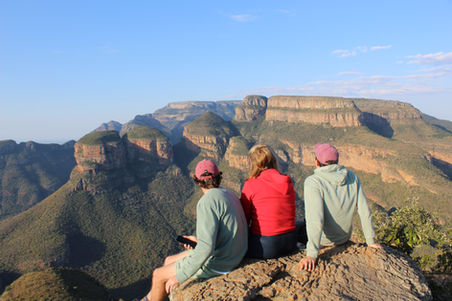
Shark and ocean ecosystem volunteer
Volunteering at this shark and marine ecosystem research centre involves a variety of different projects, methodologies and techniques. Help ensure the successful monitoring and protection of the iSimangaliso Wetland Park, a UNESCO World Heritage site.
Projects will have many exciting moments including swimming with sharks, turtles, dolphins but the true focus will be on gathering data on species and environments. Do this in the field during free and scuba dives as well as through lab work back at the centre
From identifying individual animals to monitor age, movement and behaviour, BRUV deployments (Baited remote underwater video cameras) to look for species present, seabed mapping everything else that goes into marine ecology research.
Become a volunteer
Volunteer information


Shark and coastal ecosystem research projects
Shark and ray research
Sharks and rays are keystone species influencing the populations of other species present in the ecosystem as well as ensuring its overall health.
Understanding these animals is essential for ensuring the protection of marine ecosystems.
With over 200 species of shark and ray in southern Africa you'll help monitor animals including: tiger sharks, whale sharks, manta rays and more!

What will you be doing?
-
Swim with animals to record information
-
Use video systems to monitor animals remotely
-
Individually ID different animals and movements
-
Gain evidence and document species presence
-
Use lab research to support IDing species
-
Input and analyse data for ecological management
-
Write reports and present findings
-
Raise awareness and protect habitat
Baited remote underwater video cameras
We can’t be underwater 24/7, use technology and help deploy remote video stations (BRUVs) that attract and record marine animals.
Sharks, fish and more can all make an appearance allowing you to observe and gather data on more species for greater scientific accuracy.
What will you be doing?
-
Build, maintain and use equipment
-
Record and input results from deployed cameras
-
Identify unrecognised individual animals
-
Help report and present findings


Turtle breeding and monitoring
Leatherback and Loggerhead turtles nest between November and February and hatch between January and April, during these months you’ll help monitor and record data to better understand populations of these species.
What will you be doing?
-
Record data including sex, size and age
-
Help protect any nesting or hatching site
-
Create and support educational programs
-
Monitor turtle movements

Ragged tooth shark breeding movements
Most volunteers swimming with sharks find it quite daunting at the start, however breeding ragged tooth sharks do not feed during the duration of the pregnancy.
Every animal is different. You’ll learn this and other skills to swim confidently and safely with species while you gain data and research them.
What will you be doing?
-
Local specific breeding sites used by the sharks
-
Record data relating to population amount
-
Build ID database of pregnant females
-
Record length of animals using laser photogrammetry
-
Record shark diver interactions
Coral reef surveying and mapping
There are multiple coral reefs off the shores of Sodwana bay, help map and record these areas to build our understanding of the species composition, which areas need protection to ensure ecosystem health and look at species population trends.
What you'll be doing
-
Map and survey unrecorded areas of reef
-
List and evidence species discovered
-
Record soundscape and audio of reef to monitor health
-
Raise awareness and promote protection

Museum and lab research
The research centre has a museum with many biological specimens donated by government, these are used both for education with the public as well as lab-based research.
Using the facilities and resources you’ll help research and understand marine biology for better field-based results and to help as you write reports on your findings.
What you'll be doing
-
Write reports on your results, data and analysis
-
Study lab and museum specimens
-
Help create and present to the public
-
Take part in lectures and debates

Safari drives and optional activities
Home to breathtaking sights, there are several “Big 5” wildlife reserves in the surrounding area, you’ll get to take part in safari drives and activities to discover more of the non-marine based ecosystems and animals like: elephants, lions, leopard, crocodiles, hippos, giraffe and more!
What you'll be doing
-
Take part in safari and game drives
-
Discover South Africa’s iconic wildlife
-
Get to know the iSimangaliso Wetland Park

























